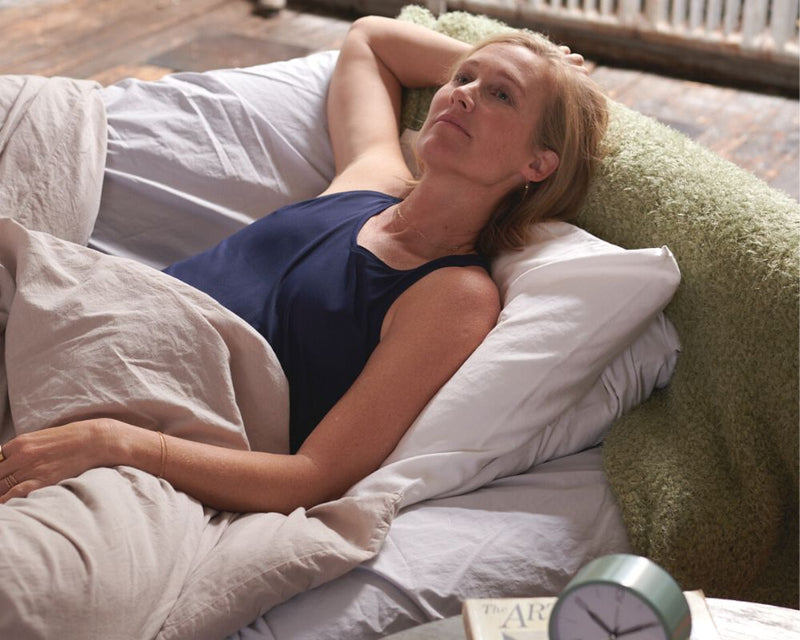5 Tips for a Better Sleep During (Peri) Menopause

This article was contributed by Perry - a website and community app to help women find support through the ups and downs of perimenopause and menopause. Medically reviewed by Patricia Shelton, MD
Many women find that their sleep suffers during perimenopause. When you’re not sleeping well, it can affect every other aspect of your life, from your mood and energy levels to your ability to think clearly and remember things. Not getting enough high-quality sleep can have a huge negative impact on your quality of life and even your overall health.
If you’re looking to get a better night’s rest during perimenopause, there are a few things you can do to help optimize your sleep. Here are 5 research-based interventions that may help you to sleep better during peri.
1. Control the temperature.
One of the biggest culprits for disrupting sleep during perimenopause is vasomotor symptoms – hot flashes and night sweats. Controlling your body temperature at night can be helpful. Pay attention to the temperature of your room. If it’s too hot, then you’ll likely have trouble sleeping. Try to keep your room between 60 and 68 degrees at night.
In addition, you can try clothing designed to keep your body cooler at night. By wicking away sweat from your skin and allowing your skin to breathe, these types of clothing may help to keep you from getting too hot at night. They also help to ensure that you don’t find yourself soaking wet and cold after a night sweat, which can also interfere with your sleep.
If hot flashes and night sweats are a major problem for you, then you could also consider taking hormone replacement therapy (HRT), which has been shown to be effective for relieving vasomotor symptoms. Not all women want to take hormones, and some women can’t take them because of their medical history. However, if HRT is an option for you and your sleep is suffering due to symptoms of perimenopause, then this is one option you could consider trying.
2. Create a routine.
The brain is excellent at pattern-finding, and responds very well to routines. Sleep is no exception. If you create a particular routine that you always follow before bed, then your brain will learn to shift into sleep mode when you do your routine. Ideally, start your bedtime routine about half an hour to an hour before bed. Some options you could include in your routine are drinking herbal tea (with no caffeine), taking a relaxing shower or bath, reading, and drawing or journaling. The more consistently your bedtime routine stays the same (such as the same flavor of tea each night), the more effective it will be at helping your brain to shift into sleep mode.
In addition, it’s important to keep your bedtime (and wakeup time) as consistent as possible. The more consistent your sleep times are, the better you’ll sleep. Consider what time you need to wake up on weekdays (such as for work), and try to wake up at that time on the weekends too. Then shift your bedtime earlier until you find that you’re feeling rested when you wake up. After that, try to keep your bedtime the same every single day, even on weekends – with very rare exceptions for special occasions. Your sleep will be far better, meaning that you’ll feel better and have more energy all day.
3. Get regular exercise.
Research suggests that people who exercise during the day tend to sleep better at night. If you’re having trouble sleeping, make sure to prioritize getting a workout in each day. The biochemical shifts created during exercise will ultimately lead to better sleep that night.
Just make sure your workout doesn’t occur too close to bedtime. If you exercise within about two to three hours before bed, then you might still be energized from your workout at bedtime, and find it harder to fall asleep. Instead, plan your workouts for a little earlier in the evening at the latest.
4. Avoid screens close to bedtime.
Melatonin is a hormone that’s naturally created in the brain when it’s time for sleep. Bright light disrupts the brain’s production of melatonin, by signaling that it’s daytime rather than nighttime. Blue light has been found to have the strongest effect. (Think about our ancestors – the only light they’d see at night would be the dim orange light of a fire.)
Artificial screens, whether from smartphones, laptops, or TVs, create a lot of bright light, including blue light. If you go to bed but find it hard to sleep, there’s a good chance that light from screens is causing this problem. It’s best to avoid screens in the last half an hour to an hour before bed. Instead, create a bedtime routine that doesn’t include any screen time. If you absolutely must look at a screen (such as to set an alarm), turn the brightness all the way down, and use a software that filters out the blue colors. (This type of filter is now built into many phones.) But even filtered light can still have an impact, so it’s really best to avoid screens completely.
5. Watch out for caffeine and alcohol
Most people are aware that drinking coffee right before bed will disrupt their sleep. However, people don’t always realize how long caffeine can last in the body. The half-life of caffeine is about five hours on average – this means that if you drink caffeine, about half of it is still in your system five hours later, and a quarter is still there after ten hours. The half-life of caffeine also varies from person to person, and it can be more than nine hours in some people.
It’s usually recommended to avoid caffeinated beverages (like coffee or green or black tea) for at least six hours before bed. However, some people may need longer than this to avoid disrupting their sleep – eight, ten, or even twelve hours. If you’re drinking an afternoon cup of coffee or tea, you may want to consider skipping this for a few days, to see whether your sleep improves.
Alcohol has a complex effect on sleep. It actually does help many people to fall asleep, but the problem is that alcohol disrupts sleep architecture later in the night – meaning that the quality of your sleep isn’t as good, and you won’t feel rested in the morning. This is why having a nightcap before bed is actually not a good idea. In fact, if you decide to drink alcohol, try to leave at least four hours between your last drink and your bedtime, to avoid disrupting your sleep.
More Posts
-
Our Story "Behind t...
As Earth Day and Fashion Revolution Day* both take place this week, we'd like to take the opportunity to share more of the story "behinds the seams...
Read More -
Embracing Mindfulne...
Entering (peri) menopause brings with it a host of physical, emotional, and mental changes. From dealing with hot flashes to mood swing...
Read More -
Become Featured on ...
We're thrilled that our Anti-Flush clothing was featured on The Quality Edit in their 'Add To Cart' column is a rundown of our their style edito...
Read More







Comments
0 Comments
Leave a Comment